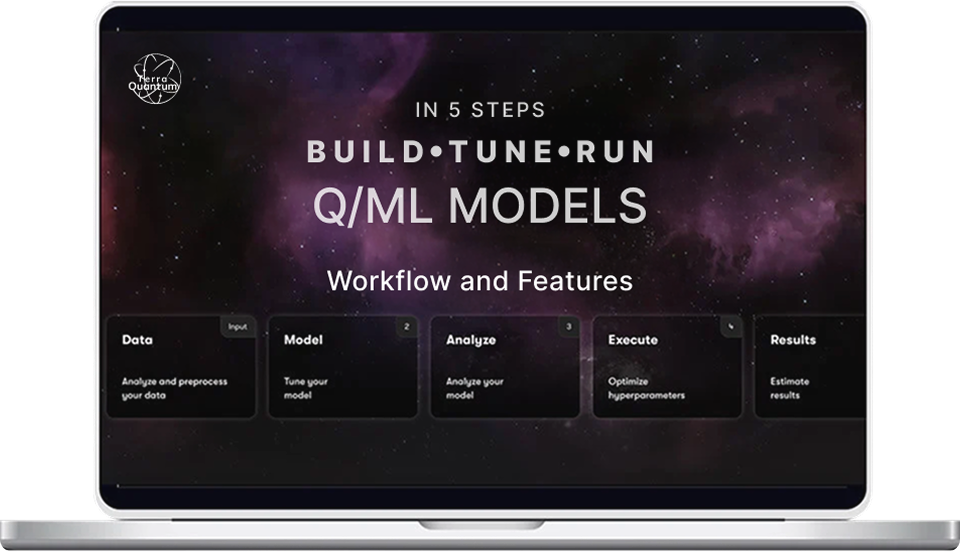
Why TQml
Unlock Scalable, High-Impact Solutions with Quantum-Enhanced ML
Superior Performance
Achieve higher accuracy and faster convergence, outperforming classical machine learning models.
Data Efficiency
Extract key patterns from small datasets, reducing data acquisition and preparation costs while accelerating insights.
Scalability by Design
Our hybrid approach offers quantum utility today, transitioning smoothly to future quantum hardware
Unmatched Versatility
Solve diverse problems, from time series prediction to enhanced image processing, physics-driven simulation and generative AI.
In the TQml Toolbox
TQml is a complete ecosystem built to transform your machine learning workflows with quantum-enhanced tools that work seamlessly together.
Compare performance across different hardware and software backends
Analyze and optimize quantum circuits for improved model performance and efficiency
Build custom hybrid quantum-classical neural networks with our comprehensive library
Optimize your model's hyperparameters efficiently and quickly
Cutting-edge Proprietary Quantum ML Framework
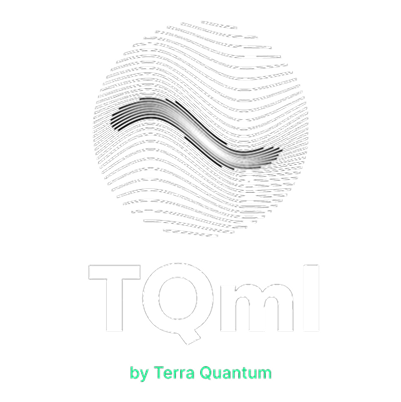
Cutting-edge Proprietary Quantum ML Framework
Leverage Terra Quantum's world-class R&D to unlock powerful capabilities. Our proprietary framework provides you with state-of-the-art tools that enhance your ML models.

Flexible Architecture
Customize your models to suit your specific challenges. TQml offers a modular design, allowing you to fuse quantum and classical layers into the most effective solutions.

Scalable Performance
Start with existing hardware and transition smoothly to quantum processors as the technology evolves. Our hybrid approach ensures that your models are future-proof.
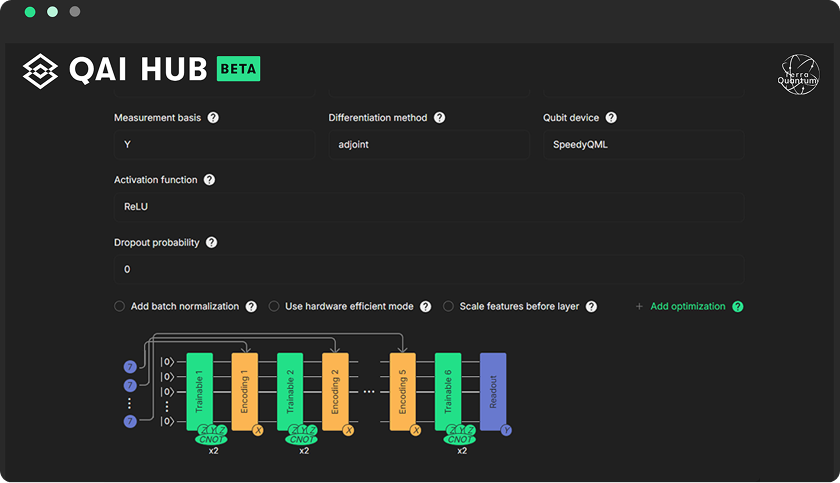
Intuitive Interface
Build complex quantum-classical hybrid models with ease using our user-friendly interface. TQml simplifies the development process, reducing the learning curve.
Architecture Overview: Inside TQnet
TQnet is the heart of TQml, offering a rich library of quantum and classical layers to construct powerful hybrid models. Our unique approach allows you to seamlessly integrate quantum computing capabilities into your neural networks.
Whether you're looking to optimize your supply chain, enhance financial forecasting, or push the boundaries of AI research, TQnet enables you to create models tailored to your specific challenges.
Benefits of Hybrid vs. Classical Approaches to QML
- Enhanced Accuracy: Capture complex patterns beyond classical model capabilities.
- Improved Generalization: Learn effectively from smaller datasets, reducing data collection and preparation costs.
- Faster Convergence: Reach optimal performance with fewer training iterations.
- Efficient Handling of High-Dimensional Data: Process complex data structures effectively.
- Future Proofing: Seamlessly adapt to advancing quantum hardware capabilities.
Problem Types and Applications
TQml excels across a wide range of machine learning tasks, offering quantum-enhanced solutions for problems such as:
Enhance Your Models with Quantum Elements
- Superior Model Performance: Integrate our proprietary quantum components to boost your foundation models.
- Model Compression Without Compromise: Reduce model sizes while maintaining accuracy, lowering computational costs.
- Advanced Fine-Tuning with QRLoRA: Improve reasoning capabilities through quantum-enhanced fine-tuning with Quantum Low-Rank Adaptation.
- Consistent and Accurate Outputs: Overcome challenges like hallucinations using our ensemble approach with multiple state-of-the-art LLMs.
- Multilingual Customer Service Transformation: Deploy reliable, avatar-based agents capable of operating in any language.
- Quantum-Enhanced Drug Design: Achieve up to 30% improvement in drug-likeness, synthetic accessibility, and logP scores.
Key Applications
Explore how quantum solutions are being applied across diverse industries and use cases.
- Customer Service Agents and Chatbots
- Intelligent Document Processing
- Molecular Generation for Drug Design
Featured Publications
Discover key publications that showcase recent progress and breakthroughs in quantum research.
Leveraging Hybrid Quantum Neural Networks to Achieve Highly Accurate Predictions
- Enhanced Pattern Recognition: Our HQNNs utilize the Hilbert space to recognize patterns more effectively with less data.
- Quantum Time Series Forecasting: Attain higher accuracy and speed in temporal data analysis using quantum algorithms.
- Real-Time Anomaly Detection: Quickly and accurately identify irregular patterns and outliers in large datasets.
- Optimized Decision-Making: Integrate time series predictions into holistic optimization models for better outcomes.
Key Applications
- Renewable Energy Forecasting
- Predictive Maintenance
- Financial Time Series Analysis
- Weather Prediction Modeling
Featured Publications
Discover key publications that showcase recent progress and breakthroughs in quantum research.
Quantum-Enhanced Image Analysis: Revolutionize Image Processing with HQNNs
- Advanced Feature Extraction: Enhanced data encoding and quantum-assisted feature extraction for superior pattern recognition.
- Real-Time Segmentation and Classification: Achieve higher accuracy with fewer parameters—8x fewer than traditional models on the MNIST dataset.
- Learn from Limited Data: Our models generalize faster and perform better even with limited training data.
- Reduced Overfitting: Quantum-based regularization methods turn noise into a beneficial factor.
Key Applications
- Earth Observation and Satellite Imagery Analysis
- Medical Imaging Diagnostics
- Autonomous Vehicle Perception Systems
- Manufacturing Quality Control
- Security and Surveillance Systems
Featured Publications
Discover key publications that showcase recent progress and breakthroughs in quantum research.
Accelerate Complex Simulations with Q-PINN and Efficiently Model Physical Processes
- Quantum Physics-Informed Neural Networks (Q-PINN): Speed up simulations and optimizations for complex physical phenomena.
- Cross-Disciplinary Generalization: Neural networks offer more versatile capabilities than traditional modeling approaches.
Key Applications
- Industrial Process Optimization
- Computational Fluid Dynamics (CFD)
- Climate and Weather Modeling
- Heat Transfer and Thermodynamic Simulation
- Materials Science Research
- Structural Analysis (Stress and Strain)
Featured Publications
Discover key publications that showcase recent progress and breakthroughs in quantum research.
Optimize Complex Scheduling and Routing with Quantum-Powered Decision Making
- Dynamic Decision-Making: Employ Hybrid Quantum Reinforcement Learning for real-time, optimized solutions.
- Handle Complex Challenges Efficiently address multi-objective and multi-constraint problems in dynamic environments.
- Significant Performance Gains Improved satellite mission planning cost functions by 70% on average in collaboration with Thales.
Key Applications
- Satellite Mission Planning
- Supply Chain Optimization
- Emergency Escape Routing
- Operations Disruption Management
Featured Publications
Discover key publications that showcase recent progress and breakthroughs in quantum research.
Exploring New Frontiers in Quantum AI
- Revolutionizing AI and Computation: Exploring how quantum computers can transform AI and computational methods fundamentally.
- Necessity for New Algorithms: Alongside fault-tolerant hardware, new algorithms and techniques in quantum machine learning are essential to harness the full power of quantum computing for AI.
- Pushing Boundaries: Our scientists are researching across multiple challenges—both known and unknown—to expand the possibilities of quantum AI.
Research Focus Areas
- Enhancing Foundation Models with Quantum Technologies
- Novel Hybrid Quantum Machine Learning (QML) Architectures
- Efficient Quantum-Classical Data Encoding and Decoding
- Addressing the Barren Plateau Problem
- Quantum Processing Unit (QPU) Embedding
Featured Publications
Discover key publications that showcase recent progress and breakthroughs in quantum research.
TQml Case Study
Challenge
A leading European energy provider collaborated with Terra Quantum to enhance the accuracy of their photovoltaic (solar) power output forecasts. Precise forecasting is critical for optimizing grid management, balancing supply and demand, and supporting the integration of renewable energy sources.
Solution
We implemented a TQml-powered Hybrid Quantum Long Short-Term Memory (HQLSTM) model to predict steam mass flow in a biomass power plant.
Results
- 40% Improvement in Forecasting Accuracy: The HQNN model significantly enhanced the prediction reliability of photovoltaic power output compared to previous models.
- 5.7x Reduction in Mean Squared Error: Achieved substantially lower prediction errors compared to the existing production model.
- Enhanced Grid Efficiency: Improved alignment of energy production with consumption patterns, reducing reliance on non-renewable backups.
Impact
- Operational Cost Savings: Reduced need for expensive fossil fuel-based energy sources.
- Environmental Benefits: Lower carbon emissions, supporting the company's sustainability goals.
- Strategic Advantage: Positioned the energy provider at the forefront of technological innovation in renewable energy forecasting.
Dive Deeper with Our Research Publications
Explore breakthroughs in quantum-powered machine learning.
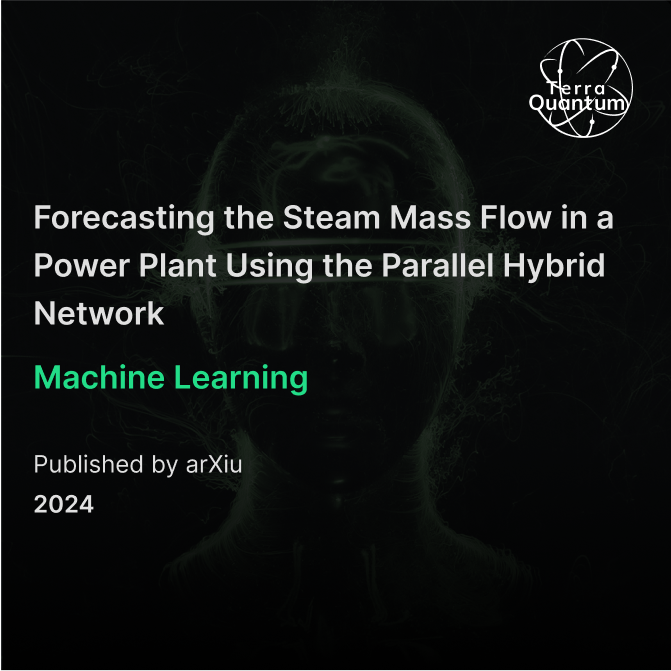
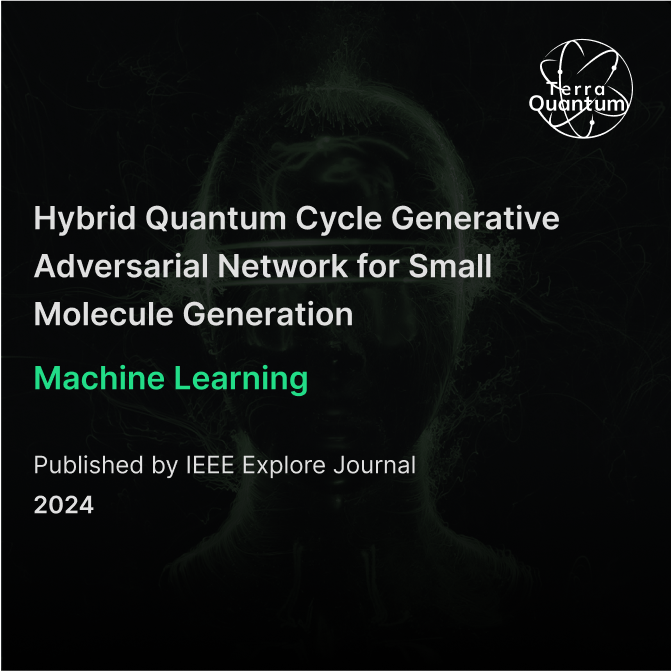
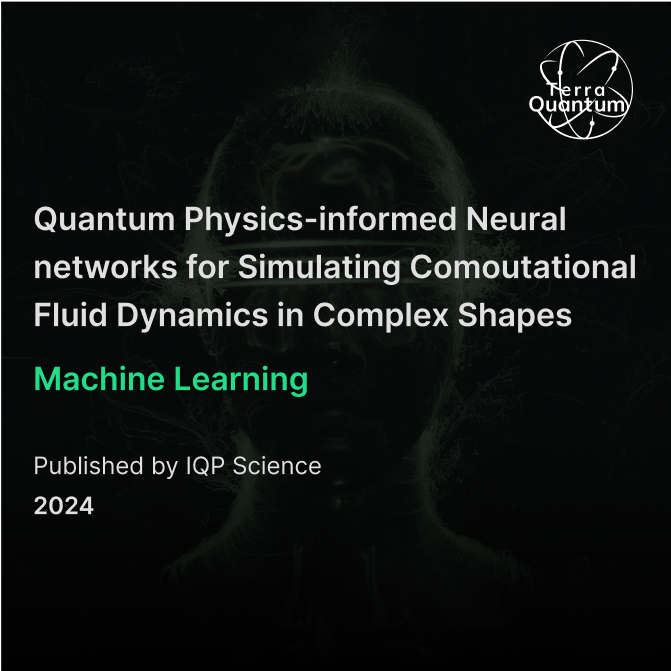
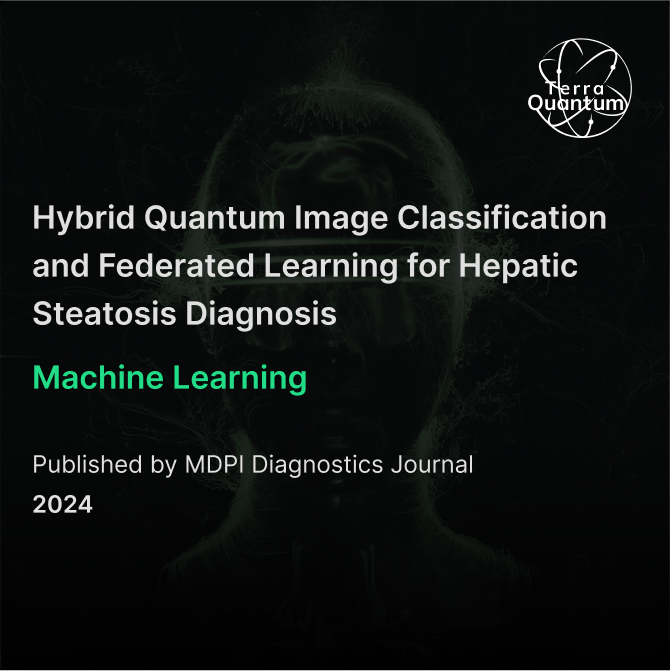
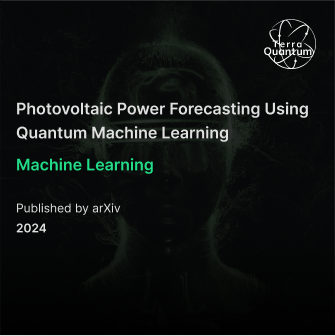
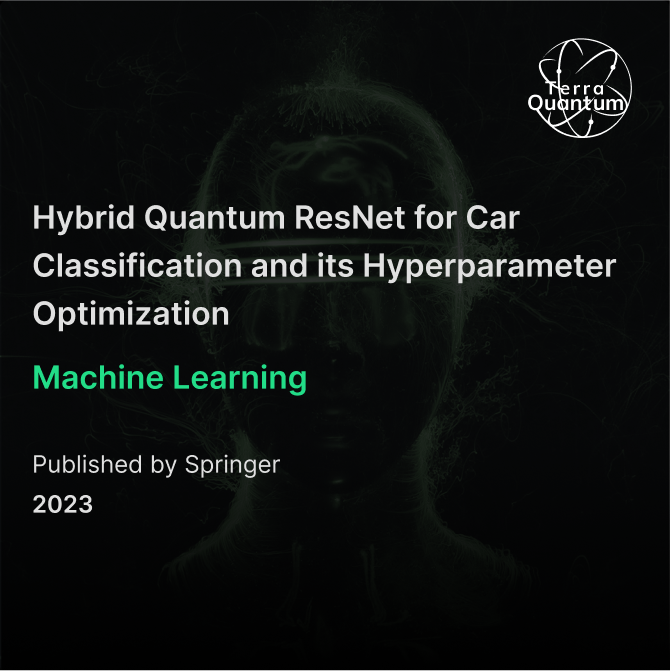
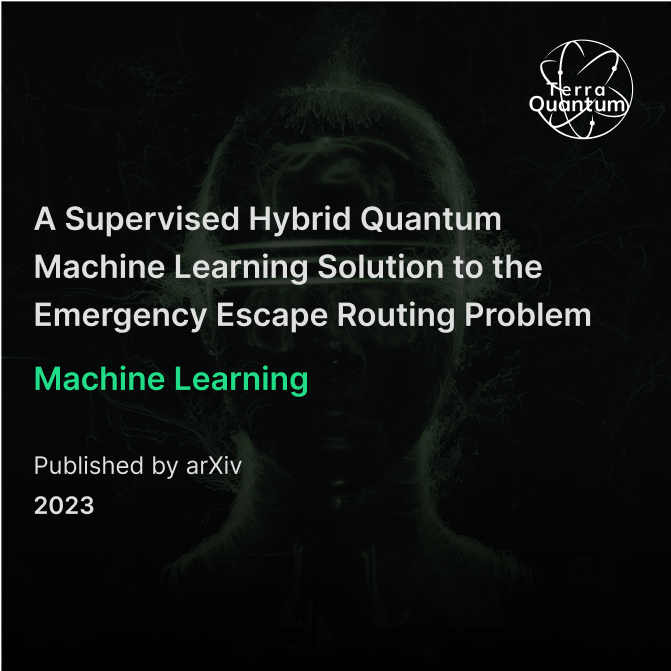
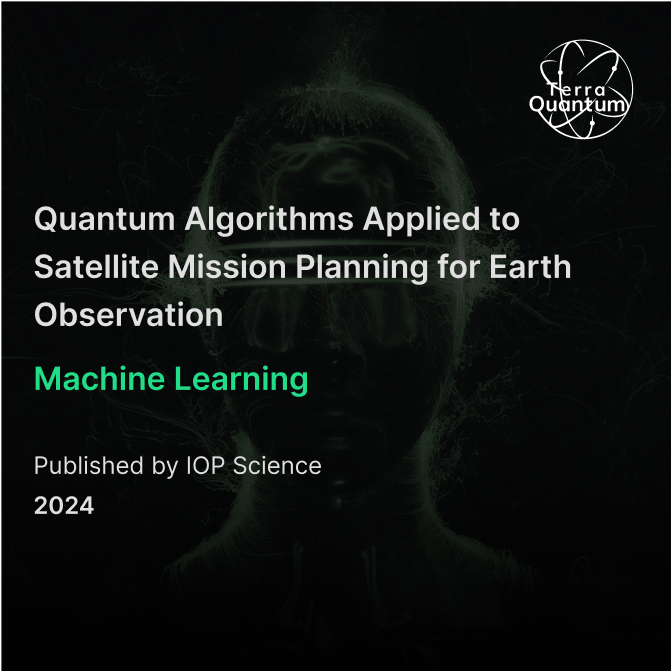
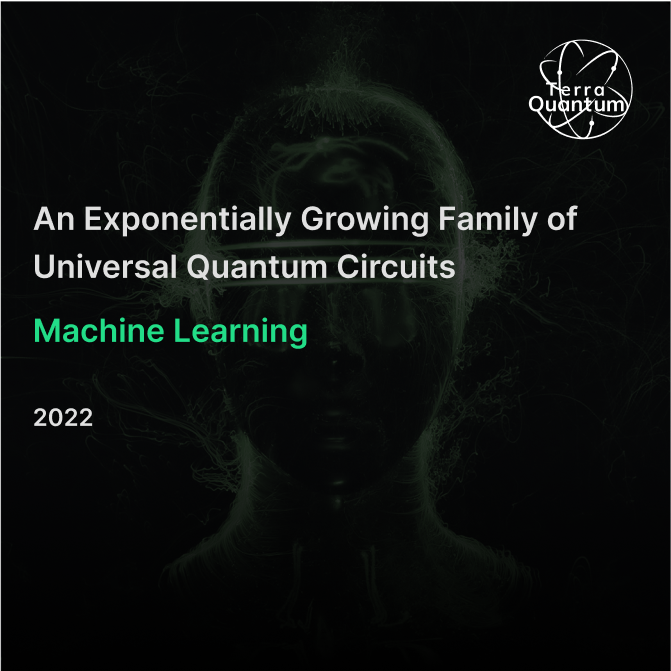
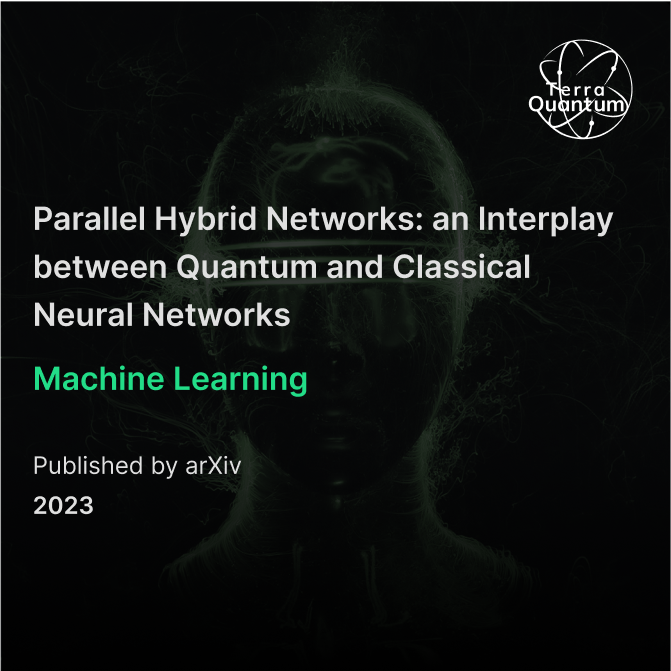
Advancing Quantum AI Software
The team at Terra Quantum integrates quantum circuits into modern AI—delivering industry-tailored solutions for time series, generative AI, simulation, and more.

Dr. Alexey Melnikov
At Terra Quantum, we develop quantum software solutions using hybrid quantum neural networks. Our algorithms, backed by academic research, seamlessly integrate parameterized quantum circuits into cutting-edge machine learning architectures, delivering industry-specific solutions with time series analysis, generative AI, large language models, and physics-driven simulation.
Leveraging our extensive experience in providing software solutions across industries, we offer our clients the quantum algorithmic TQml Python library, SDK, and web platform. This comprehensive offering is further enhanced by specialized training from our expert quantum AI team.
Leverage TQml Your Way
- Get started with using TQml in QAI Hub's friendly interface. Learn, experiment and easily create prototypes
- For production implementations, use Qode Engine’s Python SDK for cloud-based collaboration and deployment
- Training and support are available to get you up to speed quickly
More Ways to Access Our Algorithms
Every business faces unique challenges and levels of quantum expertise — our flexible ecosystem is built to support you wherever you are on your quantum journey.

Quantum-Enhanced Customer Avatars
- Access our cutting-edge quantum-enhanced generative AI for customer service
- Implement hyper-realistic, 24/7 available chatbot video avatars
- Leverage quantum LoRA and quantum neural model enhancement for superior performance

Work with Our Experts for Custom Development Services
- Collaborate with our team of quantum ML experts
- Benefit from end-to-end development of production-ready Quantum ML applications
- Get ongoing support and optimization for your specific uses

Empowering Your Team with Quantum ML Skills
Our comprehensive Quantum ML training program is designed to equip your team with the knowledge and skills needed to leverage quantum-enhanced machine learning effectively.
QML Training Program
A hands-on journey from quantum fundamentals to custom hybrid ML solutions.
- Quantum Computing Fundamentals: Understand Quantum Fundementals
- Hands-on TQml Experience: Practical sessions using our cutting-edge toolset
- Guided Use Case Exploration: Collaborative workshops to identify high-value applications
- Custom Model Development: Guidance on building and optimizing quantum-enhanced ML models